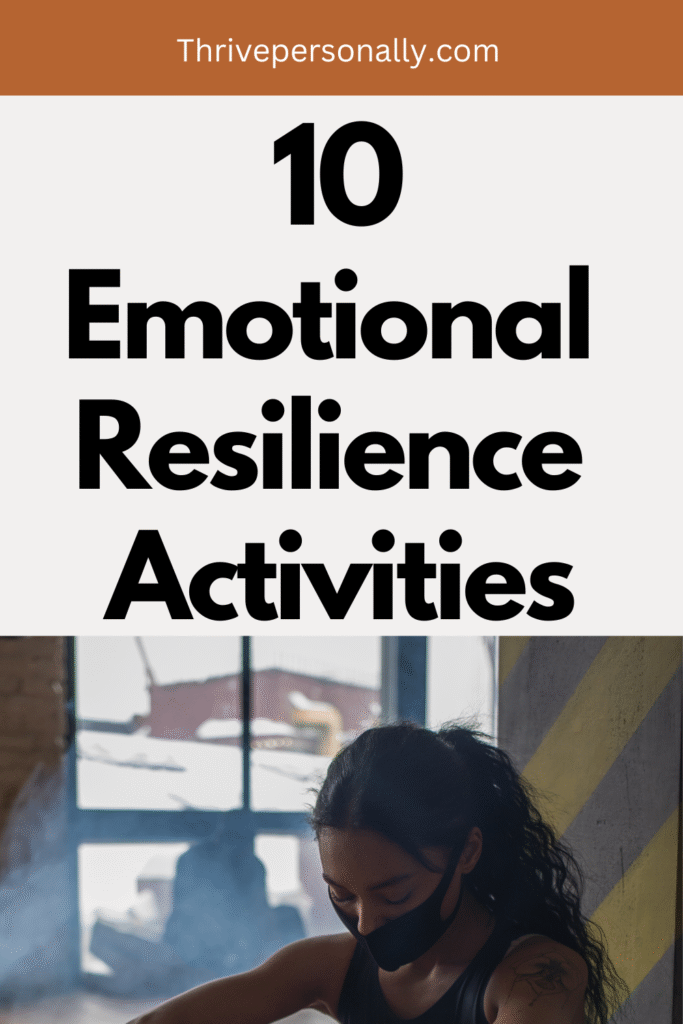Life is not always fair. Sometimes, it doesn’t go the way you want it to. You may lose a job you really wanted. A relationship might fall apart. Or something you worked hard on might fail. These kinds of tough experiences can make you feel like you’re breaking inside.
But there is a way to cope with these challenges and come out even stronger.
That way is called emotional resilience. It’s the power to bounce back from stress, pain, or failure. Being resilient doesn’t mean you won’t feel sad or angry. It means you learn how to deal with those emotions in a healthy way and keep moving forward.
Some people are naturally more resilient, but everyone can build it. Just like lifting weights makes your body stronger, emotional resilience activities help strengthen your mind and heart.
Here are 10 simple but powerful exercises to help you grow stronger inside and stay steady even when life gets rough.
10 Effective Emotional Resilience Activities
1. Write Down Your Feelings Every Day
Writing about how you feel is one of the easiest ways to build resilience. It may sound simple, but when you put your feelings on paper, you begin to understand them better.
You don’t need to worry about grammar or spelling. Just write freely.
Doing this every day, even for just 10 minutes, helps you see patterns in your thoughts. You start to name your emotions instead of just saying you feel “bad.” Over time, this helps you manage how you respond to tough moments instead of letting those feelings control you.
Research from the University of Texas at Austin shows that expressive writing can reduce stress, support your immune system, and even lift your mood.
Read also: How to Consistently Journal – 5 Tips
2. Practice Mindful Breathing
When you’re stressed or scared, you often breathe quickly and shallowly. This makes it harder to think clearly. Slowing down your breath tells your brain that you’re safe, helping you feel calm and clear.
Mindful breathing is simple. Sit still, close your eyes, and breathe in slowly… then out. Focus only on your breath. In… and out…
Even just 5 minutes a day can help you feel more grounded, especially during hard times.
Read also: 50 Emotional Intelligence Tips You Can Try
3. Create a Resilience Role Model List
Everyone needs examples to follow when life is hard. That’s why making a list of people you admire can be helpful. Think about people you know, public figures, or even characters from books or movies who stayed strong during hard times.
Write down their names and what they went through. Notice how they handled pain or struggle.
When you face a challenge, you can think, “What would they do right now?” It gives you a mental map to follow.
Read also: 6 Ways to Stop Living in Survival Mode
4. Use Gratitude to Shift Your Focus
It’s not easy to feel grateful when life feels like it’s falling apart. But that’s when it matters the most. Gratitude doesn’t mean ignoring your pain. It means choosing to also see what’s still good.
Each day, write down three things you’re thankful for. They can be small—your meal, someone’s smile, or simply waking up.
This small habit helps you see that even during pain, there are still beautiful moments. That realization builds your emotional strength.
5. Talk to Someone Who Listens
Sometimes, what you need most is someone who simply listens. No advice. No judgment. Just being heard.
Talking with someone you trust—a friend, therapist, or mentor—can help you understand your emotions. It reminds you that you’re not alone.
And if no one is around, even talking out loud to yourself in front of a mirror can help. It’s a way of letting your feelings out instead of keeping them bottled up.
6. Do Something Tough on Purpose
One of the best ways to train your inner strength is by choosing to do hard things on purpose. When you face small challenges, you train your mind to know it can handle discomfort.
Try running a mile, waking up early for a week, or learning something new. It’s not about being perfect. It’s about building your ability to stay calm when things get uncomfortable.
7. Practice Self-Compassion
When things go wrong, do you beat yourself up? Talk harshly to yourself?
That mindset weakens your resilience. Self-compassion, on the other hand, is like giving yourself a mental hug. It’s saying, “This is hard, but I’m doing my best. I’m still worthy.”
You can practice by writing yourself a kind note or placing your hand over your heart and gently saying, “I’m struggling right now, but I will get through this.”
Dr. Kristin Neff has done powerful research on how self-compassion helps people build emotional resilience.
8. Spend Time in Nature
There’s something peaceful about trees, rivers, and open skies. Nature doesn’t rush. It doesn’t judge. It just is. It reminds you that you’re part of something bigger.
Even 15 minutes outside can refresh your mind. Go for a walk. Sit on a bench. Listen to the birds. Let nature calm your busy thoughts.
9. Make a Resilience Playlist
Music can lift you up when you’re down. That’s why making a playlist of your strength songs can help. Pick songs that inspire or motivate you.
Play them when you feel low, scared, or drained. Let the music remind you of your inner power and the person you’re becoming.
10. Set One Small Goal Each Day
On your worst days, big goals can feel impossible. But small steps still matter.
Each day, set one tiny goal. Just one. It could be getting out of bed, drinking water, calling someone, or stepping outside.
When you do it, you build trust in yourself. And that’s what resilience is all about.
Final Thoughts
You don’t have to fall apart first to become resilient. You can start right now.
Resilience isn’t about being pain-free. It’s about facing life with a heart that doesn’t quit. These 10 activities are more than just tools. They are habits that shape your thoughts, future, and ability to rise again.
Try one today. Then try it again tomorrow. Slowly, you’ll notice something growing inside you.
That’s your strength showing up.
That’s your inner power beginning to shine.
Save the pin for later



